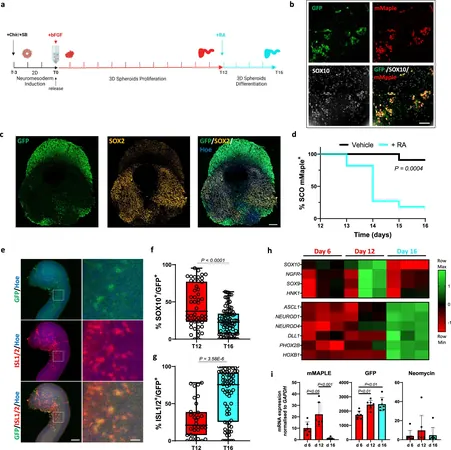
Revolutionary Diabetes Drug Sparks Hope in Battle Against Blindness!
2024-09-30
Introduction
Age-related macular degeneration (AMD) stands as one of the leading culprits of vision loss among adults over 50 in the United States, impacting about 11 million people today—a number projected to double by 2050 due to the aging population. This debilitating condition may not completely blind individuals, but it significantly hinders central vision, making routine activities like reading and recognizing loved ones a challenge.
Understanding AMD
AMD is primarily categorized into two forms: dry (atrophic) AMD, which accounts for 80-90% of cases, and wet (neovascular) AMD. Dry AMD manifests as a gradual thinning of the macula, leading to progressive vision loss, while wet AMD is characterized by the growth of abnormal blood vessels that leak beneath the retina, potentially causing rapid deterioration of vision.
Currently, no cure exists for dry AMD, although lifestyle changes and certain supplements offer some hope in slowing its progression. Wet AMD is treated with monthly eye injections, especially effective if diagnosed early on. However, once significant vision loss occurs, recovery remains elusive, fueling an urgent quest for more accessible and affordable treatments.
Could a Common Diabetes Drug be the Answer?
Some researchers are shifting their focus toward metformin—a widely used medication primarily for managing type 2 diabetes—as a potential agent in the fight against AMD. Clinical findings have suggested that metformin not only helps control diabetes but may also lower the risk of developing age-related diseases such as cardiovascular issues, cancer, and cognitive decline.
Dr. Dimitra Skondra, a leading retinal specialist and professor at the University of Chicago, believes metformin could transform AMD treatment due to its low cost, extensive safety history, and FDA approval. "We need something noninvasive and safe for early disease intervention," Skondra stated. "Metformin fits this niche perfectly."
In groundbreaking research published in JAMA Ophthalmology, Skondra and her team revealed that metformin users had significantly reduced chances of developing AMD compared to those who did not take the medication. Excitingly, another study indicated that even individuals without diabetes benefited from metformin, with protective effects against both wet and dry AMD stronger than those seen in diabetic patients.
A third study from Skondra's team also highlighted that metformin significantly reduced the chances of new-onset wet AMD, especially in individuals without diabetic retinopathy.
But the possibilities don’t stop there. Skondra's research also targets a formidable progression of dry AMD known as geographic atrophy (GA). Recent studies show that metformin can reduce GA odds by an impressive 47%, offering hope against a condition that can induce severe vision loss similar to wet AMD.
Unraveling the Mechanisms: A Multifaceted Approach
The exact mechanisms by which metformin may protect against AMD remain under investigation, yet it is believed to act through multiple pathways associated with aging. Preclinical investigations have revealed that metformin can mitigate oxidative stress, enhance mitochondrial functions, and help regulate inflammation—all critical factors in age-related deterioration.
In a fascinating twist, Skondra's research also hints at the potential influence of the gut microbiome. By assessing mouse models, her team found that metformin altered the gut microbiome favorably, leading to reduced AMD lesions and an overall improvement in retinal health. This suggests that the drug's profound effects might extend beyond traditional biochemical pathways.
Given this promising evidence, Skondra is advocating for clinical trials involving human subjects over the age of 55 to assess metformin's efficacy in preventing AMD—particularly its advanced forms that lead to vision loss and blindness.
Conclusion
As the population ages and the incidence of AMD rises, the possibility of utilizing such a well-established, safe medication could represent a monumental shift in treatment strategies.
“Many of these individuals are on the verge of enjoying their retirement, only to be struck by the devastating impact of advanced AMD,” said Skondra. “With successful trials, we could dramatically change lives and enhance the quality of life for millions.”
Stay tuned as this remarkable story continues to unfold, bringing hope to those fighting against age-related vision loss!


 Brasil (PT)
Brasil (PT)
 Canada (EN)
Canada (EN)
 Chile (ES)
Chile (ES)
 España (ES)
España (ES)
 France (FR)
France (FR)
 Hong Kong (EN)
Hong Kong (EN)
 Italia (IT)
Italia (IT)
 日本 (JA)
日本 (JA)
 Magyarország (HU)
Magyarország (HU)
 Norge (NO)
Norge (NO)
 Polska (PL)
Polska (PL)
 Schweiz (DE)
Schweiz (DE)
 Singapore (EN)
Singapore (EN)
 Sverige (SV)
Sverige (SV)
 Suomi (FI)
Suomi (FI)
 Türkiye (TR)
Türkiye (TR)